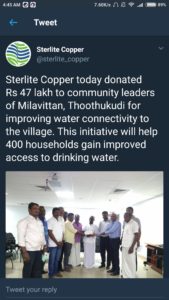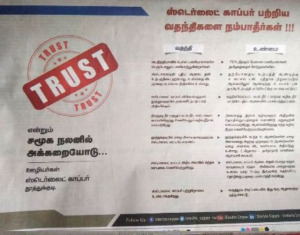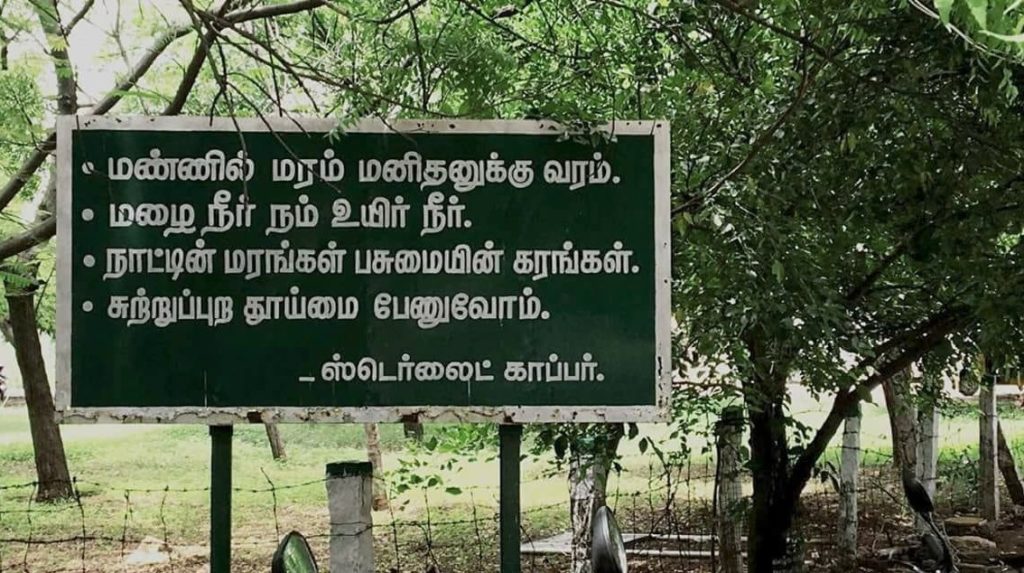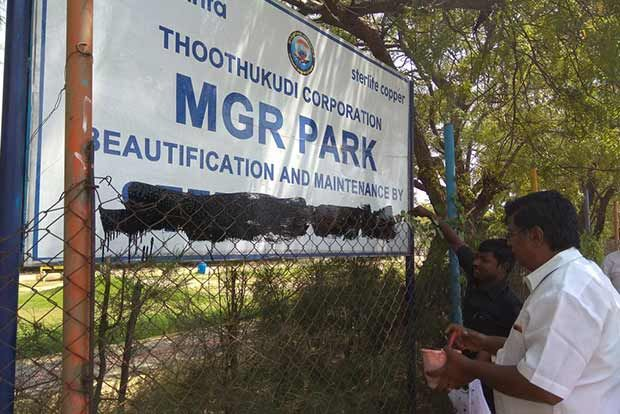Tuticorin rises against destruction of environment and mankind by Vedanta Ltd., in the name of development and economic advancement.
Geethanjali, Lois Sofia
Protests on March 24, 2018
On a Saturday evening, residents from the coastal city of Thoothukudi (also called Tuticorin) and surrounding villages in the district, came out onto the streets in large numbers protesting the proposed expansion of the copper-smelting plant, Sterlite Copper of Vedanta Ltd. There was a call for a city-wide shutdown by various organisations protesting against the plant and the action received widespread public support. Shops and businesses remained closed throughout the day and with fishing communities, most transport workers, salt-pan factories and other local businesses observing a 24-hour strike, life in the town came to a standstill.
In the evening thousands of protesters gathered at the Chidambaranagar bus stop, with the crowd stretching upto a distance of four kilometers on the Thoothukudi-Palayamkottai road, demanding that the ‘Sterlite Copper’ plant be shut down permanently.
The district has been simmering with anger and protests erupted since news of the proposed expansion of Sterlite Copper spread. The most recent protests have been spearheaded by the residents of Kumareddiyapuram and other villages adjacent to the copper smelter and have been ongoing for 62 days. On February 13th, 2018, the police arrested around 250-270 peaceful protesters from the village who were on an indefinite fast.
Mr. Krishnamoorthy, one of the organisers of the public rally, had to approach the Madurai bench of the Madras High court to obtain permission for the demonstration after the Thoothukudi police withdrew theirs citing law and order concerns. The March 24th strike, rally and protests were called by around 64 Traders’ Associations and the Anti Killer Sterlite People’s Movement.
The speakers at the rally condemned the arrests of the protesters carried out by the police department in February and the alleged physical abuse and intimidation suffered by some. Several speakers questioned whether the district administration and the police serve the public or the corporate giant Vedanta, citing their total lack of engagement with the public and the hostile response.
The anger in the air was palpable and the unprecedented scale of participation exhibited the solidarity amongst the people of Tuticorin on this subject. There were numerous banners and placards seen at the demonstration, accusing Sterlite Copper of polluting the town for its profit and endangering the health of residents. Interestingly, there were none who simply asked for the expansion plan to be scrapped, but rather almost every placard and every person we spoke to demanded that the Sterlite factory be permanently shut down. Despite the large number of people who swarmed the streets, the protests were carried out in a peaceful manner and highlighted the determination of the people.
Though Saturday’s demonstration was the largest of the recent protests, the factory has faced constant opposition since 1994, even before it started production. Sterlite Industries Ltd., as it was called before the giant merger with other Vedanta subsidiaries, started out by producing 100,000 tonnes of copper cathodes in 1997, the first year of its operations. It has steadily expanded its production, often without a valid license, with its output exceeding the limit set by the Tamil Nadu Pollution Control Board (TNPCB). The plant has also been constantly facing criticism for the extent of health and environmental damages it causes. Besides a smelting unit, it also operates a host of other factories in the same complex, including three power plants, a desalination plant, sulphuric and phosphoric acid plants. This latest proposed expansion of Sterlite Copper has been in the works for some years and if completed, will see the copper cathode production of the plant double from 400,000 tonnes per annum (in the 2016 financial year) to 800,000 tonnes per annum.
Continuing Protests
Since the protests began in the second week of February in Kumareddiyapuram, the people of atleast 12 other hamlets including Meelavittan, Vadakusankaraperi, Therkuveerapandiyapattinam, Pandarampatti, Silverpuram, Madaththur and Pudhiyamputhur have joined the daily protests and gather everyday to conduct sit-ins. Protests are also ongoing in some neighbourhoods of Thoothukudi city including Millerpuram, 3rd Mile and Fathima Nagar. On April 8th, more than 1000 people from the eight villages, along with students from colleges in Thoothukudi, protested outside the district collectorate, after the collector, N. Venkatesh, refused to meet them and receive their petition. He later accepted their petition and assured them that the district administration would participate in talks with them.
Following the recent protests, the environmentalist Nityanand Jayaraman, who has been chronicling Sterlite’s crimes for several years, wrote a series of pieces detailing the water and air pollution caused by the smelter, its effects on the health of Thoothukudi residents and the complicity of state regulators. An activist group he works with also published a new report alleging that Sterlite obtained clearances for its expansion fraudulently.
The massive March 24th gathering quickly captured public attention inside Tamil Nadu and among the Tamil diaspora. On the day of the rally, there were protests outside the London residence of Anil Agarwal, the founder and chairman of Vedanta Resources. Since then there have been more protests and shows of solidarity from Tamils in London, Toronto, Melbourne, and at least 16 cities in the U.S., including Washington DC, Dallas, New York, Chicago, Saint Paul and a number of other cities. Local media which initially ignored the protests and even the rally on March 24th were forced to cover them. In the week following the demonstration, support poured in from small and newer regional parties whose leaders visited Kumarettiyapuram, including Seeman of Naam Tamilar Katchi, Sarath Kumar of All India Samathuva Makkal Katchi and Kamal Haasan of Makkal Needhi Maiam. M.K.Stalin, working president of the opposition party, DMK has also made statements in support of the agitation. Leaders and cadres belonging to the DMK, CPI(M) and DMDK have also staged separate protests with some of them courting arrest.
Sterlite Copper decided to temporarily close just its smelting operations in the existing plant on March 28th for what they claimed was “scheduled maintenance”. On April 10th TNPCB refused to renew Sterlite’s license to continue its operations. Sterlite has a long history of operating without a valid renewal for extended periods and also constructing new factories without authorisation, which makes this move a hollow one. Also the expansion which triggered the protests are still underway and TNPCB has not canceled the “Consent to Establish” it granted for the apparently illegal expansion. This action by TNPCB has not dampened the protests. In fact after news spread on social media that copper ore from the Tuticorin port was still being transported to Sterlite despite its license being revoked, a group of activists and volunteers laid siege to Seapol, a company that transports raw material to the factory, and submitted a written petition seeking the company abandon its operations with Sterlite. They also held protests outside the port, which were contained by the police. That same night, clandestine attempts by Sterlite to transport the copper ore to its factory were blocked by some of the protestors and a few trucks were handed over to the SIPCOT police station.
Many organisations such as the Thoothukudi Lawyers Association and Tamilnadu Government Employees Association, Thoothukudi Truck Owners’ Association, Tamilnadu Government Employees’ Association and All India Central Council of Trade Unions (AICCTU) have held demonstrations or observed a one-day strike in support of the movement against Sterlite. Over the last three weeks students from almost every college in and around Thoothukudi district have also gathered outside their campuses to protest. On 13th April the Students’ Federation of India (SFI) organised a demonstration outside the Thoothukudi collectorate in which about 500 students from various colleges in the Thoothukudi district participated.
It is important to note that approximately five years ago, on March 23 2013, there was a toxic leak from the factory injuring hundreds of people which led to mass protests and complaints. Following public pressure, the TNPCB issued a closure order for the factory on March 29. Sterlite denied allegations and maintained that the emissions were within permissible levels and falsely claimed there had been no reported cases of illnesses. In fact the staff and patients at the Thoothukudi Medical College Hospital located almost 7 km away from the factory experienced uneasiness, feelings of suffocation, burning sensation in the eyes, among other symptoms. A similar gas leak on July 5, 1997 injured hundreds and left at least 90 people hospitalised. In that instance Sterlite Industries tried to deflect the blame by claiming that a neighbouring flower factory, whose employees were also taken ill, was the source of the leak.
The plant has been closed several times either by the TNPCB or the Madras High Court, including in 1998, 2010 and 2013, with Vedanta incurring losses and drop in share prices during those periods. In a shameful verdict on April 2, 2013, the Supreme Court struck down the order of the Madras High Court closing the plant and directed Vedanta to pay a paltry sum of Rs. 100 crores as compensation to the district for polluting the environment, including the water and soil between the years of 1997 and 2012 and for operating the plant without a valid renewal license for a long period. Just in the financial year 2010-11, the PBDIT (Profit Before Depreciation Interest and Taxes) for Sterlite Industries was Rs. 1043 crores and Rs. 744 crores for the financial year 2009-10. It is extremely misguided to assume that setting such a low compensation, only about 10% of the profits made in one financial year, while Sterlite carried on its destructive activities for 15 years (when the judgement was passed) would serve as a deterrent. In reality, it rewards the company for it’s offend-first and pretend-to-repent-later model of functioning.
Not long after the Supreme Court’s order, the plant reopened after the National Green Tribunal judgement in May 2013. Among the locals, Sterlite has remained notorious for wiggling out of blatant allegations against the plant allegedly by exerting political influence and bribery. Vedanta Ltd., and Sterlite Industries in particular have been very generous donors to both the BJP and Congress, especially during election years. In 2014, the Delhi high court found that the parties were in violation of the Foreign Contributions (Regulations) Act, 1976 for receiving these donations, but the government has since let them off the hook by sneaking in amendments to Finance bills.
In the two decades that this issue has smoldered on for, none of the major political parties, with the exception of MDMK, had come out in support of the people of Tuticorin and the agitations have always been community led. In fact, the sitting MLA of the Thoothukudi constituency, Ms. Geetha Jeevan of the DMK, and AIADMK’s Mr. S.T. Chellapandian, who held the seat previously, were both turned away from speaking at the March 24th rally by the protestors. The general opinion among the public is that the politicians of all parties have betrayed them in return for largesse of the mining giant, Vedanta, and the various state regulatory bodies including the TNPCB and NGT have consistently collaborated with the company. The protesting villagers have continued to keep politicians from established parties, even those who express support, at arms length to maintain their movement’s independence.
What the residents say
We spoke to a few residents of two of the most affected villages in the vicinity of the new smelter – Kumareddiyapuram and Nainarpuram, who came to the city to join other protestors. They all echoed the same sentiment, that their health and livelihoods were seriously endangered. They were fed up with Sterlite’s cover-up welfare schemes and wanted the plant to shut down permanently. Their prolonged distress and resolve to free themselves from the pain, come what may, manifested in their body language and words.
We approached a group of women from Nainarpuram that had gathered at the protest with their children. They said: “We had plenty of cultivation before Sterlite came. Now there are no crops, rainfall, or water. I used to cultivate and sell vegetables for a living. Now I collect firewood to make money. Our ailments are so bad that the doctors immediately blame Sterlite. Joint pains, miscarriages, menstrual disorders, cancer etc. are very common in every household in our village. Most children are born with disabilities and health issues. The air we breathe stinks. They bribe anybody who tries to stand up against Sterlite and silence them. They bribe us, residents, with money, free books and subsidies for our children, recycled drinking water, etc. But they destroy our lives. We don’t want their bogus welfare schemes. We only want Sterlite to shut down.”
A recently discovered report by the Department of Community Medicine, Tirunelveli Medical college lends credence to their complaints. The 2006 study which focussed on people living within a 5km radius of the Sterlite plant found high incidence of various respiratory disorders such as asthmatic bronchitis, pharyngitis etc. which are directly related to the gas emissions and vehicular pollution. Besides it also determined that a disproportionate number of women in those areas suffered from menstrual disorders. An air quality assessment released by Greenpeace in January 2018 found Thoothukudi to be the most polluted city in Southern India and one of the most polluted cities in the country with PM10 (particulate matter 10 micrometers or less) levels nine times above the limit set by the World Health Organisation (WHO). Epistemological studies indicate that exposure to PM particles have several dangerous health effects including “respiratory and cardiovascular morbidity, such as aggravation of asthma, respiratory symptoms and an increase in hospital admissions, mortality from cardiovascular and respiratory diseases and from lung cancer”, according to the WHO.
We also spoke to a mother whose son and daughter were arrested for protesting. They are currently out on bail and have to appear at the police station weekly and their mother shared with us the distress this causes all of them. There are many low-income families in the villages near Sterlite Copper who have faced this situation for several years. An auto rickshaw driver from Tuticorin that we spoke to claimed that rains near Sterlite caused a hole on the roof of his vehicle because of the high concentration of Sulphur dioxide in the air. Anecdotal reports of acid rain have been common in the villages surrounding Sterlite Copper for several years.
The residents said that mobile clinics have been sent by Sterlite to the villages regularly to distribute free medicines to the villagers for joint pain and other common ailments caused by the effluents from the plant. However, publicly the company denies that its operations have any negative impact on the residents’ health. The villagers we spoke to during the 24th March rally vowed not to let in the medicine-distributing vehicles onto their roads anymore and reportedly kept their word. According to some we spoke to, nobody from the villages around works in Sterlite or even considers it an option. Their opposition is unanimous and strong. Parents’ concern for their children seemed to be a driving force behind their protests. On March 28th parents from the village of Aththimarappetti withdrew their children from the “Khushi child care centre” which was funded by Sterlite and closed the place down. Villagers said that the Sterlite administration has been encouraging them to relocate by offering a compensation of Rs. 5 lakhs or more per family, while maintaining a facade to the outside world that its operation does not affect the surrounding population or the environment.
Some residents also alleged that the company has been increasingly hiring workers from outside the state of Tamil Nadu who do not feel as conflicted about working at the polluting plant. We spoke to ex-workers who claimed that around 10 years ago the company brought in large number of migrant labourers in response to some workers’ efforts to organise. We also learnt that the majority of workers are employed by contractors, are poorly paid and these were the jobs for which locals were usually hired. In its 1997-98 annual report (a copy of which we have in our possession) Sterlite boasted of holding “the rare status of a Union Free Company” and so it remains to this day.
The Social Responsibility Facade
Social welfare schemes have been regularly commissioned by Sterlite to maintain its veneer as a corporation sensitive to the environment, while it continues to get away with  its devastating operations. Over the years Sterlite Copper has unsuccessfully used various tactics to quash the protests against its presence in Thoothukudi. It tries to widely publicise small recruitment drives in local colleges. Sterlite openly advertises paying huge sums of money to “community leaders” as seen in this tweet dated March 10, 2018. Locals claim that Sterlite paid the money to a handful of panchayat leaders of Milavittan to connect around 400 households in the village to the water supply provided by the City Municipal Corporation of Thoothukudi in order to quell the burgeoning protests against the expansion. It also undertakes “beautification” projects around the district – adding a lick of paint to public walls in railway stations and parks, which only serve as a constant reminder to the residents of the injustice meted out to them.
its devastating operations. Over the years Sterlite Copper has unsuccessfully used various tactics to quash the protests against its presence in Thoothukudi. It tries to widely publicise small recruitment drives in local colleges. Sterlite openly advertises paying huge sums of money to “community leaders” as seen in this tweet dated March 10, 2018. Locals claim that Sterlite paid the money to a handful of panchayat leaders of Milavittan to connect around 400 households in the village to the water supply provided by the City Municipal Corporation of Thoothukudi in order to quell the burgeoning protests against the expansion. It also undertakes “beautification” projects around the district – adding a lick of paint to public walls in railway stations and parks, which only serve as a constant reminder to the residents of the injustice meted out to them.
Below is a hoarding in front of the Thoothukudi collectorate put up by Sterlite Copper which reads “Trees in the soil are man’s gift, Rain water is life’s essence, A country’s trees are its green hands, Let’s maintain environmental purity”.
On 5th April, a group of protesters headed by activist and lawyer Athisaya Kumar defaced signages and hoardings erected by Sterlite in Thoothukudi. Earlier, on 2nd April, Aam Aadmi Party (AAP) Thoothukudi, had petitioned the Thoothukudi collector N Venkatesh to remove all hoardings set up by Sterlite around the town, and no action had been taken.
Another strategy has been to organise its employees to undertake small counter-protests, and present “two sides” to the story. Reports have suggested that in Madaththur on 12th April, some miscreants threw stones at a bus carrying the employees and their families who were on their way to the collectorate to appeal for a renewal of Sterlite’s consent to operate. Peaceful protests have been a hallmark of the recent movement against Sterlite, to not let the focus of the narrative stray from the main objective of the plant’s permanent closure. Some organisers of the campaign against Sterlite we spoke to disputed that the bus was attacked by people involved with the protests and said that the incident does not represent the true nature of the movement, which has only been peaceful for two months. The overwhelming opposition of residents of Thoothukudi to the plant is evident from the fact that the latest uprising was organic and has received huge public support even without the involvement of any political party and almost no formal organising.

Photo by Geethanjali. Source: Dinamani (a Tamil daily)
A newspaper advertisement, purportedly on behalf of the employees of Sterlite, dated 25th March 2018, a day after the mass protest, is one of Sterlite’s many brazen efforts to cover up major violations on its part. The ad tabulates “facts” and “rumours” and reiterates Sterlite’s position that it does not pollute the groundwater or the sea, 70% of the employees are from within the state and that the new plant will only use water recycled from waste the city produces and sea water (as opposed to groundwater reserves), and its effluents do not cause cancer.
There is a pediatric block in the Thoothukudi Medical College Hospital built with funding from Sterlite Copper, which also employs a few cleaning workers on a contractual basis. One of the workers told us that she would rather the factory shuts down permanently than keep her poorly paid job. In our conversations with residents, even those who are the supposed beneficiaries of Sterlite’s various “Corporate Responsibility” projects, and from the messages on the numerous banners and slogans at the rally, it was apparent that they felt demeaned by the publicity tricks undertaken by Vedanta.
Ms. Dhanalakshmi from Nainarpuram village summed up the feeling prevailing in the district by saying, “If Sterlite went on with its expansion plans, Tuticorin and its surrounding villages in the 30-mile radius will be destroyed and we will all die. We might as well die fighting”.





Congrats sofia and Geethanjali for the article.